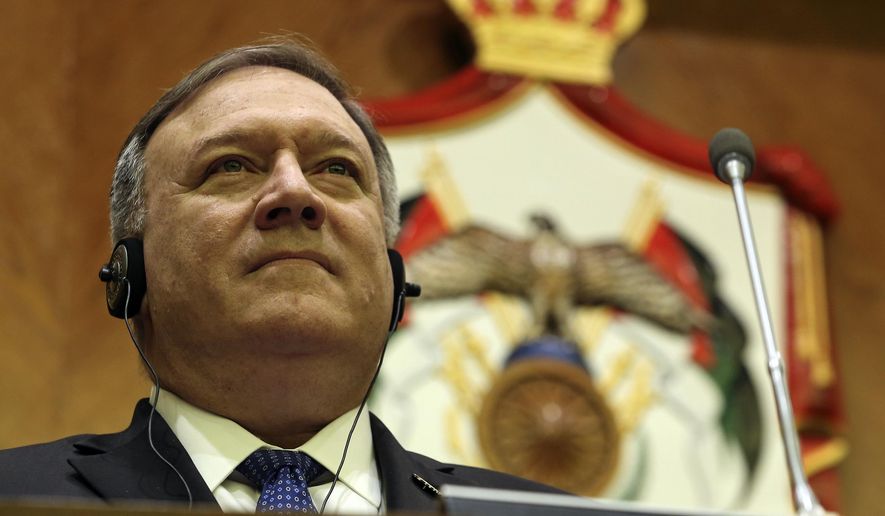The Trump administration on Tuesday renewed its assertion that it “does not want war” with Iran, and top officials suggested the U.S. is in the midst of back-channel diplomacy as it seeks to avoid military conflict.
The messaging was softened a day after the Pentagon announced the deployment of 1,000 more troops to the Middle East after analysts said direct negotiations may be the only way to prevent a military clash.
Tensions have escalated in recent days after the U.S. accused Iran of attacking two oil tankers in the Gulf of Oman and Tehran threatened to ramp up uranium enrichment. Still, neither side has slammed the door on diplomacy.
Secretary of State Mike Pompeo told reporters Tuesday that the administration is in regular communication with the Iranian leadership through intermediaries such as Japanese President Shinzo Abe, who visited Tehran last week.
“We have been engaged in many messages,” Mr. Pompeo said after meeting with the heads of U.S. Central Command and U.S. Southern Command in Florida. “President Trump does not want war.”
Mr. Pompeo said the administration’s campaign of maximum economic pressure, which began immediately after Mr. Trump withdrew the U.S. from a multinational deal to limit Iran’s nuclear program last year, has succeeded in battering the Iranian economy to the point that Tehran will be forced to come to the negotiating table and ultimately make concessions.
In addition to the imposition of sanctions on Iran, the administration has spent recent months attempting to uphold a global embargo on Iranian oil. U.S. officials have also formally listed Iran’s Islamic Revolutionary Guard Corps as a terrorist organization and funneled arms to Tehran’s chief geopolitical enemy, Saudi Arabia.
So far, however, the pressure campaign seems to have resulted only in a more belligerent Iran. Iranian President Hassan Rouhani said Tuesday that his nation will not flinch in the face of U.S. aggression.
“This war will end with the Iranian nation’s victory because the other side is not a nation, but a group of inexperienced politicians, and we do not wage war against any nation,” Mr. Rouhani was quoted as saying by the Iranian Students’ News Agency. “On this side, it is not just a group of authorities, but the entire Iranian nation. The enemies’ sanctions are directly against each and every individual and the lower classes.”
Mr. Rouhani’s comments underscored what regional analysts say is a key consideration inside Iran: The nation cannot be seen as giving in to the demands of the U.S. and must be able to claim at least a partial victory in any negotiations with Washington.
“The Iranians do have an appetite for negotiating, but I think what is holding things up right now — and that’s the part that the Trump administration perhaps is not really comprehending — is they have to save face,” said Mehrzad Boroujerdi, a professor of political science at Syracuse University who specializes in Iran and Middle Eastern politics.
“I think they are already signaling that they are interested in a diplomatic resolution of these things,” Mr. Boroujerdi said.
Other analysts say the key to any negotiations will be ensuring that both sides are able to claim that their strategies have been effective.
Iran could claim that the economic pressure campaign hasn’t worked and that is why the U.S. has resorted to ramping up its military presence in the Middle East. Washington, on the other hand, could say its strategy has forced Iran into a corner and caused it to lash out by threatening to abandon the Obama-era nuclear deal and launch strikes on oil tankers.
“Both of these narratives of success are essentially establishing a predicate for negotiations, which is where I think this is going,” said Ray Takeyh, senior fellow for Middle East studies at the Council on Foreign Relations.
Mr. Trump has expressed openness to direct negotiations with Iran, though he said little on the subject Tuesday.
“We’re very well set. We’re very well configured. We have a lot of things going on with Iran,” Mr. Trump told reporters before heading to a campaign event in Florida.
In the meantime, other nations in the region are taking steps to head off a military conflict.
Iraqi Prime Minister Adel Abdul-Mahdi said any foreign troops and local militias operating inside his country are not allowed to confront one another on Iraqi soil. All foreign forces, Mr. Abdul-Mahdi said, must operate under the supervision of the Iraqi military.
The comments were perceived as a warning to both Washington and Tehran that Iraq will not allow itself to become a battlefield in a U.S.-Iranian war.
About 5,000 American troops are deployed in Iraq, and Iranian-backed militias are operating on the ground there. Analysts say the proximity of U.S. forces and Iranian-backed militias in Iraq and in nearby waters raise the risk of accidental confrontation that could spark a bigger conflict.
“The situation in the Persian Gulf and Sea of Oman is dangerously close to a conflict,” said Hooshang Amirahmadi, a Rutgers University scholar and the president and founder of the American Iranian Council. “The militaries, particularly those of Iran and the United States, are very close to each other, and incidental encounters are possible.
“Last month, the U.S. deployed additional troops, bombers and an aircraft carrier to the region after administration officials said they received “credible threats” that Iranian-backed groups were planning to target American forces inside Iraq.
• Ben Wolfgang can be reached at bwolfgang@washingtontimes.com.




Please read our comment policy before commenting.